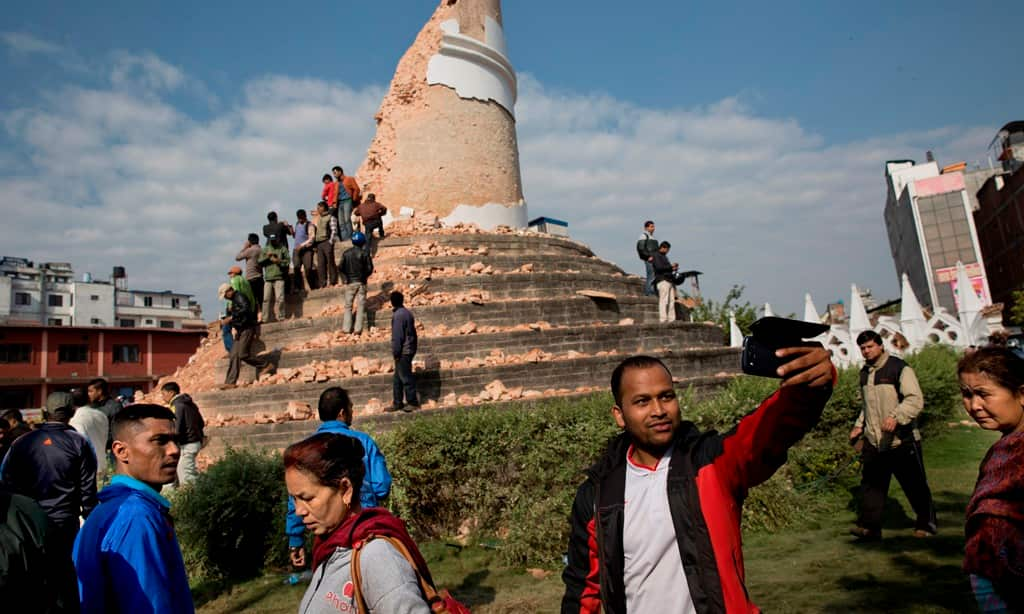In a world that is obsessed with social media and, more increasingly, selfies, it’s no surprise that respect is becoming something of a foreign concept.
Earlier this week a UK tourist posed for a selfie on a beach in Tunisia. The beach that a mere 24 hours earlier was the site of terror and death.
He’s not the first to do so.
Selfies from a number of events over the last few years have depicted tragedy juxtaposed with smiles and hugs.
At the East Village gas explosion in New York earlier this year, tourists gathered in inanely grinning groups while rescuers continued to search for life in the debris behind. At the earthquake in Nepal in April, people clambered amongst the rubble to get the best selfie shot.
Then there are the selfies that were taken at the scene of terror at the Lindt Cafe in Martin Place late last year.
So why is it that selfies seem to abolish decency in these situations? Is our need for ‘disaster porn’ too hard to ignore, or are we simply being sucked into a technologically driven society that has lost all sense of respect?
Jocelyn Brewer, a psychologist with expertise in digital technology and its impact on society and behaviour tells me that we shouldn’t be so quick to judge.
“To some degree using our camera phones has become habitual and automatic. We reach for our phones in almost any moment of communication, because we are wired to share and belong,” she says.
“Selfies are about formation of identity and the signaling of a person’s presence or experiences.” Brewer says that our need to be connected to a time and a place often means that etiquette steps over a particular implied social boundary and becomes unacceptable or distasteful.
Brewer says that our need to be connected to a time and a place often means that etiquette steps over a particular implied social boundary and becomes unacceptable or distasteful.

A man takes a selfie at the historic Dharahara Tower, a city landmark, that was damaged in Saturday’s earthquake in Kathmandu, Nepal, Monday, April 27, 2015. Source: AAP
Because of this Brewer says that everyone is quick to label a selfie taker as narcissistic and self-centered. However, she personally doesn’t believe this is always the case.
“Etiquette lines are not set out in any selfie101 manual or rulebook, and people may have varying social and emotional skills and cultural understandings of how to behave in certain situations.”
But does that mean that people’s respect for death and tragedy is being numbed?
“On face value it might seem to be but, to some degree, these images could be seen to provide further perspectives and representations of the events to audiences beyond traditional media,” says Brewer. “Again, it comes down to the motive of the post, not the fact the post was taken.”
She believes that social media provides a vehicle for bad behaviour, a channel for show offs, and that it has given rise to a generation who ‘post first, think later’.
“The pervasiveness of technology has given rise to a “if it feels good, do it” mentality, and people make decisions based on how it makes them look online, rather than using their moral compass,” she says.
Musson says that the rise of selfies at the scene of devastation also raises the question of whether people are less in tune with their emotions and ability to grasp the gravity of a situation.
“It is no longer enough to actually pay your respects. We are on a mission to ensure we are seen to be paying our respects on as many mediums as possible, with little or no regard for those who are actually paying their respects.”
“It is a sad indictment of society where we have to remind people about what is appropriate but, sadly, we are there,” she says.
Whatever your views are on this, it’s unlikely we will see a decline in this kind of behaviour. If anything, I imagine it will only increase.
However, I don’t personally envisage taking selfies at the scene of any devastation. In fact, I can safely say this is not a trend that I will ever be part of.
Jo Harley is a freelance journalist and writer.

